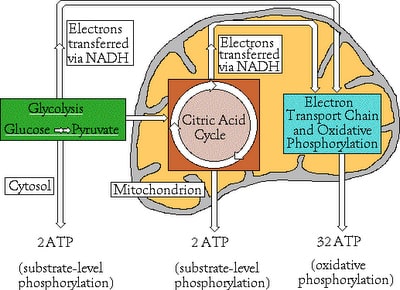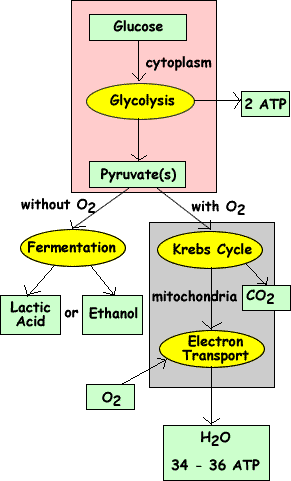|
Other articles:
|
 Cellular Respiration. Cells, like all things, need energy to operate. CD players use batteries for energy, cells use adenosine triphosphate (ATP) for energy .
May 18, 2010 . Overview of the cellular respiration processes. Image from Purves et al., Life: The Science of Biology, 4th Edition, by Sinauer Associates .
This activity is an interactive, animated exploration of cellular respiration, including: о the electron transport system о aerobic and anaerobic electron .
Cellular respiration is a process by which cells harvest the energy stored in food. Glycolysis, the citric acid cycle, and electron transport are the three .
Cellular Respiration. Cells, like all things, need energy to operate. CD players use batteries for energy, cells use adenosine triphosphate (ATP) for energy .
May 18, 2010 . Overview of the cellular respiration processes. Image from Purves et al., Life: The Science of Biology, 4th Edition, by Sinauer Associates .
This activity is an interactive, animated exploration of cellular respiration, including: о the electron transport system о aerobic and anaerobic electron .
Cellular respiration is a process by which cells harvest the energy stored in food. Glycolysis, the citric acid cycle, and electron transport are the three .
 File Format: Microsoft Word - Quick View
What Is Cellular Respiration?. Part of the series: Human Physiology. Cellular respiration is the chemical reaction that helps a person to turn the sugar in .
Feb 8, 2010 . This page is an annotated index of major online resources dealing with the biochemical pathways of carbohydrate, lipid, amino acid and .
The point of cellular respiration is to harvest electrons from organic compounds such as glucose and use that energy to make a molecule called ATP. .
Cellular respiration of glucose is carried out in three stages in most organisms . The first stage is a biochemical pathway called glycolysis. .
File Format: Microsoft Word - Quick View
What Is Cellular Respiration?. Part of the series: Human Physiology. Cellular respiration is the chemical reaction that helps a person to turn the sugar in .
Feb 8, 2010 . This page is an annotated index of major online resources dealing with the biochemical pathways of carbohydrate, lipid, amino acid and .
The point of cellular respiration is to harvest electrons from organic compounds such as glucose and use that energy to make a molecule called ATP. .
Cellular respiration of glucose is carried out in three stages in most organisms . The first stage is a biochemical pathway called glycolysis. .
 The term cellular respiration refers to the biochemical pathway by which cells release energy from the chemical bonds of food molecules and provide that .
This article will help you to understand the process of cellular respiration -- including where it takes place, why it is important, and what it produces.
Overview of biochemistry of energy conversion within the organelle, as part of Kimball's Biology Pages.
Cellular respiration is the process in which an organism breaks down fuel ( usually glucose, but glycogen, protein, and/or lipids may be used) to capture .
Jan 11, 2011 . Cellular respiration is the metabolic process that occurs largely in the mitochondria of eukaryotes, whereby cells obtain energy from .
The process of creating cell energy is known as cellular respiration. Most of the chemical reactions involved in cellular respiration happen in the .
The term cellular respiration refers to the biochemical pathway by which cells release energy from the chemical bonds of food molecules and provide that .
This article will help you to understand the process of cellular respiration -- including where it takes place, why it is important, and what it produces.
Overview of biochemistry of energy conversion within the organelle, as part of Kimball's Biology Pages.
Cellular respiration is the process in which an organism breaks down fuel ( usually glucose, but glycogen, protein, and/or lipids may be used) to capture .
Jan 11, 2011 . Cellular respiration is the metabolic process that occurs largely in the mitochondria of eukaryotes, whereby cells obtain energy from .
The process of creating cell energy is known as cellular respiration. Most of the chemical reactions involved in cellular respiration happen in the .

 Aug 7, 2007 . This is a remake of the Red Hot Chili Peppers "Californication" It is intended to teach the process of Cellular Respiration Lyrics: It all .
Cellular respiration is the process by which the chemical energy of "food" molecules is released and partially captured in the form of ATP. .
Is a, GO:0009061 anaerobic respiration. Part of, GO:0022904 respiratory electron transport chain. Regulates, GO:0043457 regulation of cellular respiration .
Cellular Respiration delivers the energy that cells need to live, from synthesizing proteins, to building microtubules and microfiliments for structure . .
As cells do cellular respiration, they need a way to store and transport electrons. There are two main chemicals that are used to do this. .
cellular respiration, quiz. . Cellular Respiration Quiz · Cellular .
Aug 7, 2007 . This is a remake of the Red Hot Chili Peppers "Californication" It is intended to teach the process of Cellular Respiration Lyrics: It all .
Cellular respiration is the process by which the chemical energy of "food" molecules is released and partially captured in the form of ATP. .
Is a, GO:0009061 anaerobic respiration. Part of, GO:0022904 respiratory electron transport chain. Regulates, GO:0043457 regulation of cellular respiration .
Cellular Respiration delivers the energy that cells need to live, from synthesizing proteins, to building microtubules and microfiliments for structure . .
As cells do cellular respiration, they need a way to store and transport electrons. There are two main chemicals that are used to do this. .
cellular respiration, quiz. . Cellular Respiration Quiz · Cellular .
 WORD BANK. 1 ATP 2 ATP 36 ATP 4 NADH 1 FADH Electron transport chain. Mitochondrion Cytoplasm Fermentation Glycolysis Glucose Pyruvate Lactic acid .
Particularly, the process of cellular respiration consists of a series of oxidation and reduction reactions occurring within a complex electron transport .
Cellular respiration occurs mainly in the mitochondria.
Respiration at the cellular level is known as internal (cellular or tissue) respiration and can be divided into two stages. In the first, glycolysis, .
5 posts - 5 authors - Last post: Nov 15, 2010Definition and other additional information on Cellular respiration from Biology -Online.org dictionary.
WORD BANK. 1 ATP 2 ATP 36 ATP 4 NADH 1 FADH Electron transport chain. Mitochondrion Cytoplasm Fermentation Glycolysis Glucose Pyruvate Lactic acid .
Particularly, the process of cellular respiration consists of a series of oxidation and reduction reactions occurring within a complex electron transport .
Cellular respiration occurs mainly in the mitochondria.
Respiration at the cellular level is known as internal (cellular or tissue) respiration and can be divided into two stages. In the first, glycolysis, .
5 posts - 5 authors - Last post: Nov 15, 2010Definition and other additional information on Cellular respiration from Biology -Online.org dictionary.
 Organisms, such as plants, can trap the energy in sunlight through photosynthesis and store it in the chemical bonds of carbohydrate molecules.
Molecular Expressions Virtual Microscopy Website. Visit the interactive Java- powered virtual microscopes. These virtual microscopes explore specimen focus, .
Take the Cellular Respiration Quiz and find out how much you know about .
Plant cells do not have the capacity to use glucose in cellular respiration, because they get their energy from photosynthesis. Check. mitochondrion.jpg .
Organisms, such as plants, can trap the energy in sunlight through photosynthesis and store it in the chemical bonds of carbohydrate molecules.
Molecular Expressions Virtual Microscopy Website. Visit the interactive Java- powered virtual microscopes. These virtual microscopes explore specimen focus, .
Take the Cellular Respiration Quiz and find out how much you know about .
Plant cells do not have the capacity to use glucose in cellular respiration, because they get their energy from photosynthesis. Check. mitochondrion.jpg .
 Graphic Organizers. Photosynthesis & Cellular Respiration . Energy in Food ( The Open Door); Respiration & Activity (The Open Door); Energy & Activity (The .
Graphic Organizers. Photosynthesis & Cellular Respiration . Energy in Food ( The Open Door); Respiration & Activity (The Open Door); Energy & Activity (The .
 Cellular respiration allows organisms to use (release) energy stored in the chemical bonds of glucose (C6H12O6). The energy in glucose is used to produce .
Cellular respiration allows organisms to use (release) energy stored in the chemical bonds of glucose (C6H12O6). The energy in glucose is used to produce .
 During Cellular Respiration, sugar is broken down to CO2 and H2O, and in the process, ATP is made that can then be used for cellular work. .
faculty.nl.edu/jste/cellular_respiration.htm[PPT] Cellular RespirationFile Format: Microsoft Powerpoint - Quick View
Cellular respiration harvests the energy created during photosynthesis through . Glycolysis is the first step of cellular respiration, where a molecule of .
During Cellular Respiration, sugar is broken down to CO2 and H2O, and in the process, ATP is made that can then be used for cellular work. .
faculty.nl.edu/jste/cellular_respiration.htm[PPT] Cellular RespirationFile Format: Microsoft Powerpoint - Quick View
Cellular respiration harvests the energy created during photosynthesis through . Glycolysis is the first step of cellular respiration, where a molecule of .
 The series of metabolic processes by which living cells produce energy through the oxidation of organic substances. cellular respiration .
The series of metabolic processes by which living cells produce energy through the oxidation of organic substances. cellular respiration .

 In this BrainPOP movie, Tim and Moby teach you everything you need to know about cellular respiration--including how it's different from the respiratory .
In this BrainPOP movie, Tim and Moby teach you everything you need to know about cellular respiration--including how it's different from the respiratory .
 Respiration resources and links for Students and Teachers from FT Exploring.
Respiration resources and links for Students and Teachers from FT Exploring.
 TITLE: Cellular Respiration SOURCE: Jay Phelan, What is Life? . KEYWORDS: cellular respiration, glycolysis, Krebs cycle, electron transport, mitochondria.
TITLE: Cellular Respiration SOURCE: Jay Phelan, What is Life? . KEYWORDS: cellular respiration, glycolysis, Krebs cycle, electron transport, mitochondria.
 cellular respiration (biochemistry), the process by which organisms combine oxygen with foodstuff molecules, diverting the chemical energy in these .
cellular respiration (biochemistry), the process by which organisms combine oxygen with foodstuff molecules, diverting the chemical energy in these .
 Metabolism Problem Set. This problem set is designed to give a basic understanding of some of the fundamental concepts of metabolism. .
Metabolism Problem Set. This problem set is designed to give a basic understanding of some of the fundamental concepts of metabolism. .
 Cellular respiration is the set of the metabolic reactions and processes that take place in the cells of organisms to convert biochemical energy from .
Cellular respiration is the set of the metabolic reactions and processes that take place in the cells of organisms to convert biochemical energy from .
 File Format: PDF/Adobe Acrobat - Quick View
File Format: PDF/Adobe Acrobat - Quick View
 File Format: Microsoft Powerpoint - Quick View
Photosynthesis question: What is cellular respiration? EASY TO UNDERSTAND BASICS ABOUT CELLULAR RESPIRATION: Respiration is the process by which cells .
File Format: Microsoft Powerpoint - Quick View
Photosynthesis question: What is cellular respiration? EASY TO UNDERSTAND BASICS ABOUT CELLULAR RESPIRATION: Respiration is the process by which cells .
 Jun 26, 2001 . Cellular respiration (def) is the process cells use to convert the energy in the chemical bonds of nutrients to ATP energy. .
Sitemap
Jun 26, 2001 . Cellular respiration (def) is the process cells use to convert the energy in the chemical bonds of nutrients to ATP energy. .
Sitemap
|









































